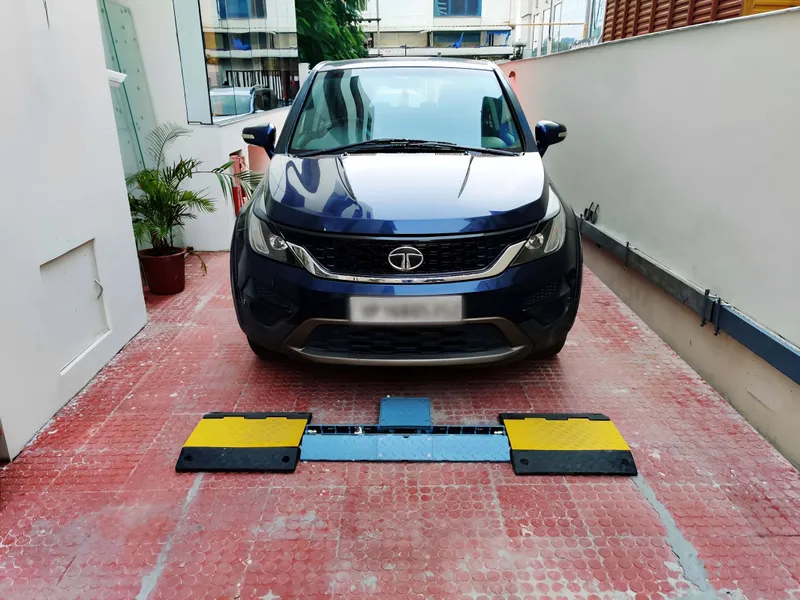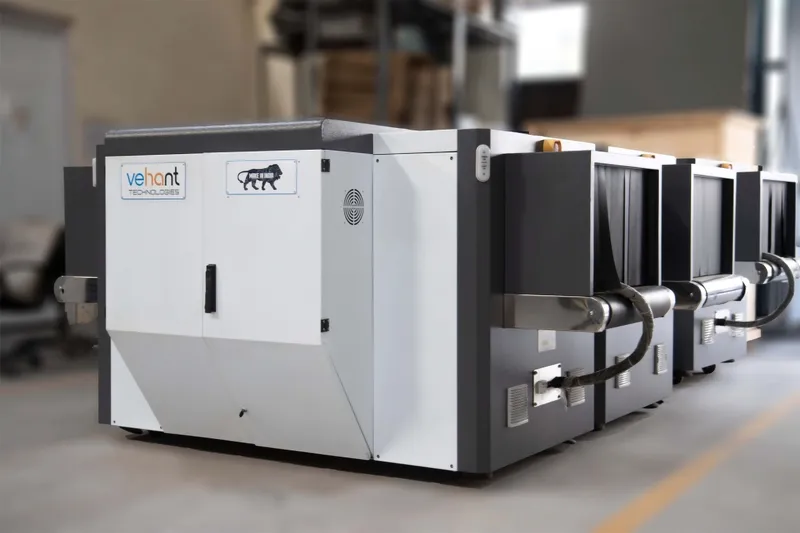From under-vehicle scanning to AI: Vehant's evolution in security tech
Vehant Technologies works in the areas of security screening, safe and smart city analytics, and enterprise analytics. The company’s revenue stood at Rs 73 crore in FY23.
Incubated in IIT-Delhi in 2005, security tech company Vehant Technologies’ inception can be traced back to the 2001 Parliament attack.
After the attack, the government took several steps to tighten security, and one of the products the government deployed was the under-vehicle scanning system. These systems were imported from the UK.
“The cost of each [system] was Rs 1 crore,” says Kapil Bardeja, CEO and Co-founder of .
The Ministry of Information Technology approached IIT-Delhi to make such products in India because of the substantial cost involved in importing. “That is how our journey began in the space,” says Bardeja.

Vehant's under-vehicle scanning system
Currently, Noida-based Vehant operates within three primary domains: security screening, safe and smart city analytics, and enterprise analytics. It serves a range of clients, including the Airport Authority of India, Delhi Police, Indian Navy, Telangana Secretariat, Adani, and Indore High Court.
Vehant recently secured an order worth Rs 90 crore from the Airport Authority of India. The company, which leverages AI, Machine Learning (ML), and deeptech solutions, has also installed security equipment in the new parliament building in New Delhi and deployed security devices at the Telangana Secretariat.
Additionally, it has started working with the Maharashtra government on certain projects.
Vehant has a workforce of 370 people. It has an R&D facility in Noida covering an area of 30,000 square feet, and two factories in Greater Noida and Himachal Pradesh covering a combined area of 40,000 square feet. These facilities serve as spaces for both product development and manufacturing.
In FY23, the company's revenue stood at Rs 73 crore. It witnessed a YoY revenue growth of 26% in FY22 and FY23. Vehant anticipates a YoY growth rate of 100% in FY24.
The journey
While doing his MBA from IIT Delhi, Bardeja met his Co-founder Anoop Prabhu, who now serves as the Chief Technology Officer at Vehant and looks after all the tech developments.
When Vehant was incubated at IIT Delhi in 2005 by Bardeja and Prabhu, five professors from the computer science department were also a part of the founding team. Commercial operations started two to three years later in 2008. The first product the company made was an under-vehicle scanning system.
So far, Vehant has sold 900 such systems, each costing around Rs 25 lakh to Rs 35 lakh. In the security screening space, it now manufactures X-ray baggage scanners and explosive detectors. The primary market is aviation and it has deployed its scanners and systems in around 60 airports in India.

X-ray baggage scanner
Talking about competition, Bardeja says, that it primarily competes with global firms such as Smiths Detection and Gatekeeper based in the UK, and Rapiscan based in the US. In vehicle scanning technology, the detection rate is higher than Indian counterparts. Some of the Indian competitors include Autopass and Awiron.
Around eight years ago, Vehant forayed into the traffic management space. It currently operates within 50 smart cities. The use cases in this space include identifying instances of red light violations, speed violations, absence of seat belts, detection of mobile phone usage, and instances of unauthorised entry.
During the COVID-19 pandemic, in 2020, Vehant entered the safe city analytics and enterprise analytics space. It developed an AI programme to detect violations involving face masks, social distancing, and to monitor vehicle movement through Automatic Number Plate Recognition (ANPR) during lockdowns.
In the enterprise analytics space, Vehant serves factories and retail stores.
“We are expanding the safe city analytics space. We are a frontrunner for traffic management systems, but for this segment, we are a new entrant. A lot of our marketing efforts are towards expanding this business segment as it has a lot of potential,” says Bardeja.
The technology to combat crimes - how does it work?
In safe city analytics, the already existing surveillance cameras are utilised. These cameras transmit their footage to a central control station, initially intended for event capturing and post-event analysis.
Given the existing backend infrastructure, Vehant developed AI models and analytics to contribute to the real-time detection of events.
“What we essentially do is that at the control center where there is a feed coming in from these cameras, we take a parallel stream and put it in our analytics,” says Bardeja.
There are many analytics options available to choose from. For example, if a camera observes a particular area like a market, predefined zones can be designated for analytics applications, for scenarios like chain snatching, collapse, vandalism, and crowd gatherings.
The AI continually assesses the video feed. Instances of higher crowd density than normal or vandalism can trigger alarms. The AI can detect events like chain-snatching scenarios. These kinds of scenarios are enacted and fed into the system and it can subsequently detect similar instances.
“When an alarm activates, the corresponding camera feed magnifies in the control room for operators to assess and possibly notify authorities,” says Bardeja.
Next, Vehant aims to train the AI in a way that it predicts an event. “This is very futuristic, but we believe that if a camera is running at a place for a few months, it can map the trends and prevent an event too,” says Bardeja.
The safe city analytics is deployed in four cities currently, including Jammu, Gurgaon, Lucknow, and Allahabad. It took around two years to develop the products and the segment was launched in 2022.
Vehant aims to achieve a revenue of Rs 10 crore in FY23 from the safe city analytics space.
Currently, revenue distribution encompasses 60% from security screening, 30% from traffic management (smart cities), and 10% from enterprise analytics.
Edited by Affirunisa Kankudti







